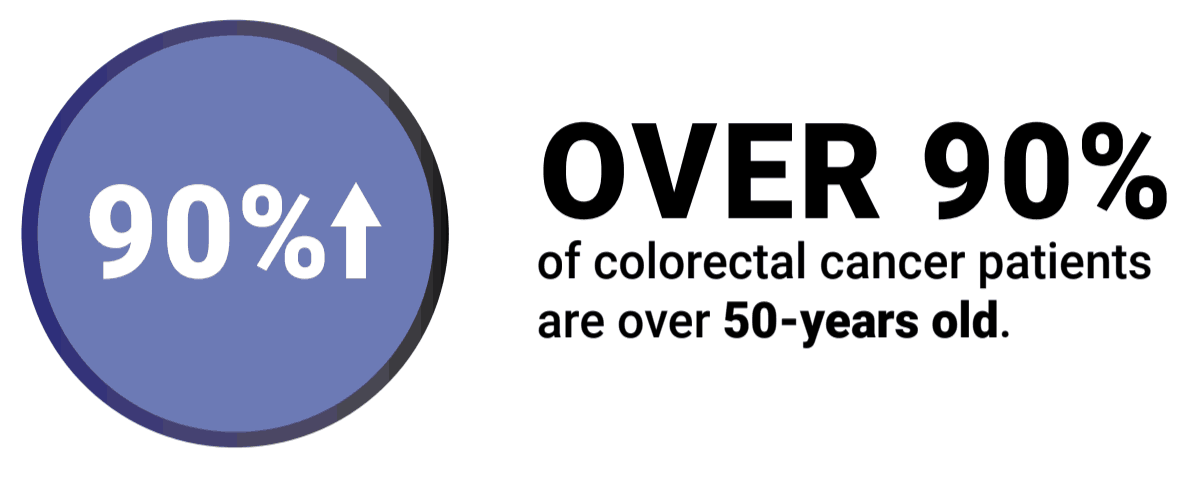Colon Cancer Screening
Colon Cancer affects almost one out of twenty Americans. Colonoscopy is a safe, comfortable screening test that reduces the lifetime risk of colorectal cancer by almost 90%. Most cancers start off as a small, slow-growing, pre-cancerous ‘polyp’, or growth inside of the colon. Regular screenings reduce the risk of colorectal cancer by almost 90%, by finding & removing these small growths on the lining of the colon, before cancer develops or spreads.

What is Colorectal Cancer?
 When colon cancer is detected in its earliest stage, the five-year relative survival rate is about 90%. Largely due to the availability of high quality Colonoscopy, along with advances in cancer treatments, the death rate has been falling for several decades. A primary reason why is that colon & rectal polyps are now being discovered & removed during regular screening.
When colon cancer is detected in its earliest stage, the five-year relative survival rate is about 90%. Largely due to the availability of high quality Colonoscopy, along with advances in cancer treatments, the death rate has been falling for several decades. A primary reason why is that colon & rectal polyps are now being discovered & removed during regular screening.
Colorectal cancer is a disease in which abnormal cells in the colon or rectum divide uncontrollably, ultimately forming a malignant tumor. The colon and rectum are parts of the large intestine and the digestive system. The colon absorbs water and nutrients and passes waste (stool or poop) to the rectum. Colon and rectal cancers are grouped as colorectal cancer because the organs are made of the same tissues, and there isn’t a clear border between them.
Most colorectal cancers begin as a polyp, a growth in the tissue that lines the inner surface of the colon or rectum. Polyps may be flat, or they may be raised. Raised polyps may grow on the inner surface of the colon or rectum like mushrooms without a stalk (sessile polyps), or they may become like a mushroom with a stalk (pedunculated polyps). Polyps are common in people older than 50 years of age, and many are not cancer. However, a specific type of polyp known as an adenoma has a higher risk of becoming cancer.
Who is at Risk for Colorectal Cancer?
Colorectal cancer is the Second leading cause of Cancer-Death, in men and women in the U.S. Your risk of getting colorectal cancer increases as you age. Over 90% of those diagnosed with the disease are aged 50 years or older. Other risk factors include:
- A personal history of inflammatory bowel diseases such as Crohn’s disease or ulcerative colitis
- A family history (typically among close relatives) of colorectal cancer or colorectal polyps
- A genetic syndrome such as familial adenomatous polyposis (FAP) or hereditary non-polyposis colorectal cancer (Lynch syndrome)
- Lack of regular physical activity
- A diet low in fruit and vegetables
- Being overweight or obese
- Alcohol consumption
- Tobacco use
Types of Colorectal Cancer Screening
The Centers for Disease Control and Prevention (CDC) recommends that adults aged 45 to 75 be screened regularly for colorectal cancer. People at an increased risk of developing colorectal cancer should talk to their doctors about when to begin screening, which test is right for them, and how often to get tested.
Several screening tests can be used to find polyps or colorectal cancer. You should consult your gastroenterologist to determine which of the following tests are right for you.
Stool Tests
Polyps in the colon and small cancers may cause small amounts of bleeding that cannot be seen with the naked eye. Stool tests check your stool for either blood, or small fragments of DNA from a cancer already growing in the colon.
- The most common stool test is the guaiac-based fecal occult blood test (gFOBT): an annual at-home exam to detect blood in the stool.
- The fecal immunochemical test (FIT) is administered in the same way as a gFOBT but uses antibodies to uncover hidden blood in the stool.
- The stool DNA test is done to identify cancer DNA in the stool. You collect stool, and send it to a lab to be examined for cancer cells.
Flexible Sigmoidoscopy
This test uses a small flexible scope to view the lower part of your colon. Because the test only looks at the last one-third of the large intestine (colon), it may miss some cancers that are higher in the large intestine.
Your physician will insert a small, flexible, lighted tube into your rectum and check for polyps or cancer inside your rectum and the lower portion of your intestine.
Colonoscopy
A colonoscopy is a sedated examination of the inner walls of the rectum and colon (the large intestine). The test is performed using a flexible tube (about the width of your little finger) called a colonoscope. A colonoscopy allows a gastroenterologist to examine the entire colon, and establish the presence of polyps, cancer, diverticulitis, colitis, and other colonic conditions.
A colonoscopy can also be employed as a follow-up test if anything unusual is found during one of the other screening tests. Regular colonoscopy screening is recommended every ten years, in most patients.
Here at Palm Endoscopy Center, we perform colonoscopies in a safe, friendly, and pain-free environment. Most of our patients report high satisfaction with the comfort of the procedure.
How Do I Know Which Screening Test is Right for Me?
Every type of screening test has its pros and cons, and there is no exact perfect fit for everyone. Your GI doctor will be able to guide you, and together you’ll decide which is the best option for you and how often to be tested.
Your choice of screening test will depend on:
- Personal preferences
- Medical history
- The probability of having the test
- The available resources for testing and follow-up
If you’d like to learn more about colonoscopy or how colorectal cancer screening can help you prevent the onset or progression of the disease, please feel free to contact us. We’ll be happy to answer any of your questions and address any of your concerns.
